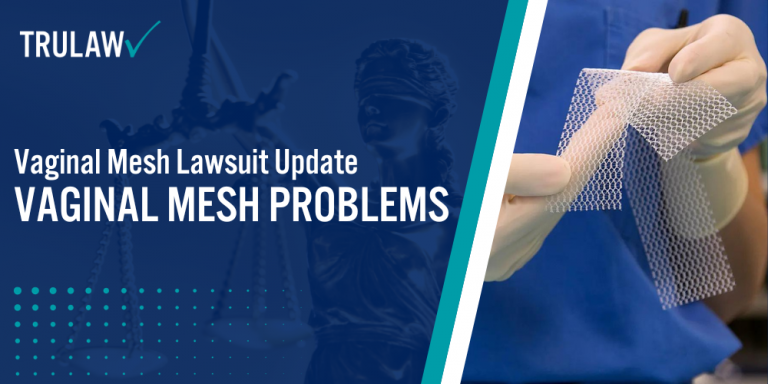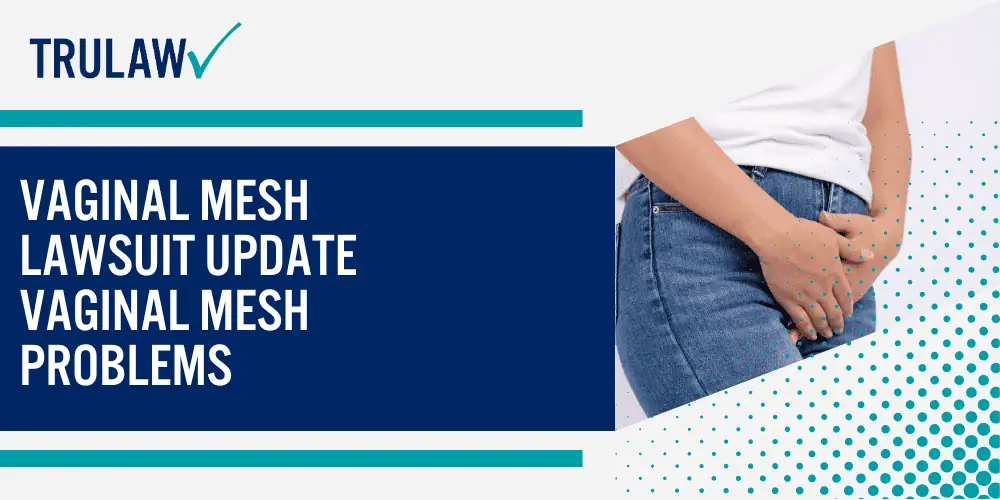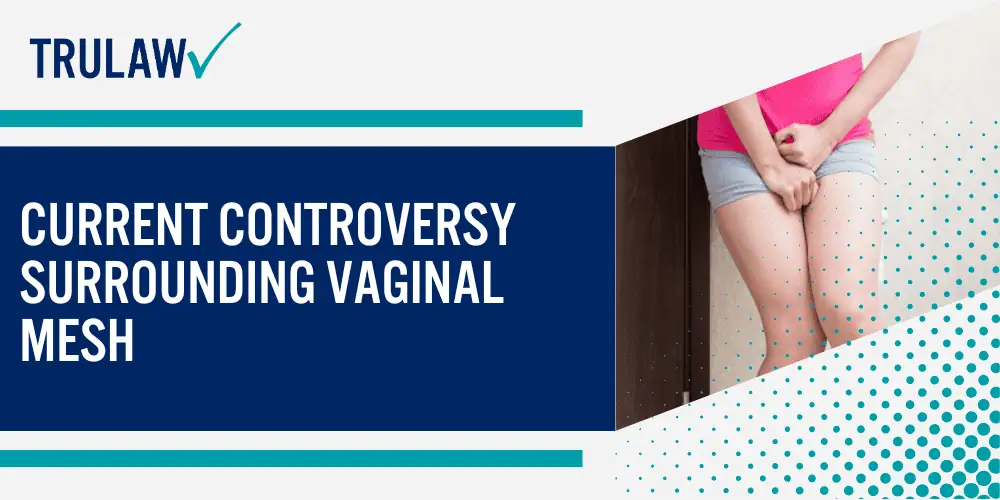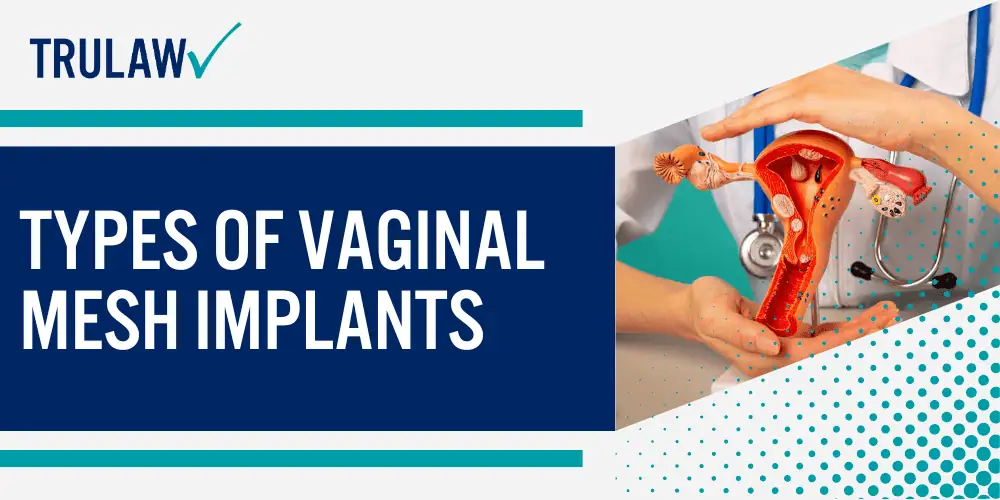Vaginal Mesh Lawsuit Update | Vaginal Mesh Problems
- Last Updated: June 12th, 2025

Attorney Jessica Paluch-Hoerman, founder of TruLaw, has over 28 years of experience as a personal injury and mass tort attorney, and previously worked as an international tax attorney at Deloitte. Jessie collaborates with attorneys nationwide — enabling her to share reliable, up-to-date legal information with our readers.
Legally Reviewed
This article has been written and reviewed for legal accuracy and clarity by the team of writers and legal experts at TruLaw and is as accurate as possible. This content should not be taken as legal advice from an attorney. If you would like to learn more about our owner and experienced injury lawyer, Jessie Paluch, you can do so here.
Fact-Checked
TruLaw does everything possible to make sure the information in this article is up to date and accurate. If you need specific legal advice about your case, contact us by using the chat on the bottom of this page. This article should not be taken as advice from an attorney.
Key takeaways:
- The FDA has raised concerns about the safety of medical devices and the healthcare industry's responsibility for ensuring patient safety.
- Many women who received implants were not fully aware of the risks and complications associated with the surgery.
- Various manufacturers have agreed to substantial settlements, with some plaintiff lawyers estimating that the total settlements may reach up to $11 billion.
Overview of the Vaginal Mesh Lawsuit
On this page, we’ll discuss an overview of the Vaginal Mesh Lawsuit, average Vaginal Mesh Lawsuit settlements and payout amounts, complications and injuries linked to Vaginal Mesh problems, and much more.
Intro to the Vaginal Mesh Lawsuits
If you or a loved one has been injured by complications related to vaginal mesh or pelvic mesh, it is still possible to file a product liability lawsuit against the implant manufacturer.
The most frequently reported injuries linked to Vaginal Mesh include, but are not limited to:
- Chronic pain
- Infections
- Urinary problems
- Vaginal scarring
- Organ perforation
- Recurrence of pelvic organ prolapse.

The potential settlement value of the Vaginal Mesh Lawsuit is estimated to range from 150,000 to 450,000, depending on a variety of factors.
If you’ve experienced vaginal mesh complications, injuries, or adverse effects from a transvaginal mesh implant- you may be eligible to file for the Transvaginal Mesh Lawsuit.
Contact the experienced Transvaginal Mesh Lawyers at TruLaw today for a no-obligation consultation.
We’re here to help you seek the compensation you deserve.
Table of Contents
Vaginal Mesh Lawsuit Update | Vaginal Mesh Problems
Vaginal mesh, also known as transvaginal mesh or surgical mesh, is a net-like implant used in female pelvic reconstructive surgery to support weakened vaginal walls and treat pelvic organ prolapse (POP) and stress urinary incontinence (SUI).

Purpose of vaginal mesh
The primary function of vaginal mesh is to manage symptoms of stress urinary incontinence (SUI) and pelvic organ prolapse (POP).
SUI is a condition that results in involuntary urine leakage during physical activities or even when sneezing or coughing.
On the other hand, POP occurs when weakened vaginal walls fail to support pelvic organs like the uterus, bladder, and rectum.
The mesh acts as a scaffolding to hold these organs in their correct positions, thereby improving comfort and functionality.
Types of mesh materials used
Various materials are used in the construction of surgical mesh devices for treating pelvic floor disorders.
These treatments include:
- Synthetic Polypropylene: The most popular and widely used material for surgical mesh devices, synthetic polypropylene is flexible, easy to work with and provides substantial reinforcement to weakened vaginal walls.
- Type I Monofilament Large-Pore Polypropylene Mesh: This specific type of polypropylene mesh finds extensive use in pelvic organ prolapse repair surgeries due to its robustness and durability.
- Biological Material: Some surgical meshes are made from animal tissues.
- Polymers: Alongside traditional mesh materials like polypropylene, surgeons sometimes use polymers for their superior flexibility and resistance to infection.
- Transvaginal Meshes: A net-like synthetic material, the transvaginal mesh offers additional support when repairing damaged or weak internal tissue during reconstructive surgery.
- Urogynaecological Meshes: Similarly designed like the transvaginal mesh, urogynaecological meshes help treat conditions such as stress incontinence that leads women to opt for this kind of surgery.
How the mesh is implanted
The surgical mesh is implanted through a small incision made in the vaginal wall.
This incision allows surgeons to place the mesh around weakened or damaged tissue, providing extra support for prolapsed organs.
The commonly used mesh for this purpose is the Type I monofilament, large-pore polypropylene mesh. Once implanted, the mesh serves as a reinforcement structure, helping to maintain the appropriate positioning of pelvic organs.
Current Controversy Surrounding Vaginal Mesh
The vaginal mesh has become a subject of intense debate.

Concerns have also been raised linking the surgical mesh devices to autoimmune problems – escalating debates on the safety of these synthetic meshes used in female pelvic reconstructive surgery.
Alleged complications
The complications associated with vaginal mesh have led to a surge in lawsuits and have sparked significant concern within the medical community.
Some of the reported issues include:
- Pain: Persistent and often debilitating discomfort is a common complication following transvaginal mesh surgery.
- Bleeding: Unanticipated vaginal bleeding has been reported post-procedure.
- Mesh Erosion: The mesh material may erode or break down over time, leading to a condition known as vaginal mesh erosion.
- Reactions to Mesh Material: Some bodies reject the synthetic mesh material, causing painful reactions.
- Organ Perforation: Instances of surgical errors or sharp edges from the eroded mesh puncturing surrounding organs have been reported.
- Urinary Problems: Issues like incontinence and recurrent urinary tract infections are often linked to vaginal mesh implants.
- Nerve Damage: This can result from either surgical damage or pressure exerted by the implanted mesh on nearby nerves.
- Scarring and Shrinkage: Vaginal scarring and shrinkage are severe complications often resulting from mesh erosion.
Connection to autoimmune problems
Recent studies have suggested a link between vaginal mesh implants and autoimmune disorders such as lupus and rheumatoid arthritis.
While not yet conclusively proven, this relationship has been noted by researchers worldwide and adds an additional layer of complexity to the ongoing debate about the safety of these devices.
The challenge lies with doctors correctly identifying this correlation since symptoms often mimic those associated with other health conditions.
Prevalence of Mesh Implants
Accurate statistics on the total number of women who have received mesh implants are difficult to obtain.
However, a recent survey indicated that 59% of women respondents reported experiencing problems with their pelvic mesh implant.
This suggests that a significant number of women have undergone such procedures and have faced complications, leading to legal actions like vaginal mesh lawsuits and settlements reaching up to $188.7 million.
Types of Vaginal Mesh Implants
The difference between Transvaginal Mesh and Vaginal Mesh depends on the brands, their specific uses, and how they impact women undergoing these procedures.

Different Manufacturers and Brands

Some of the notable manufacturers include:
- Johnson & Johnson: Known for Gynecare Prolift, a transvaginal mesh used primarily in pelvic reconstructive surgery.
- Boston Scientific Corp.: Renowned for its polypropylene mesh devices designed to treat stress urinary incontinence and pelvic organ prolapse.
- C.R. Bard: Provides Avaulta, a synthetic mesh used mainly for treating pelvic floor disorders and weakened vaginal wall conditions.
- American Medical Systems (AMS): Offers a range of products including Elevate, Apogee, and Perigee systems designed to repair pelvic organ prolapse.
- Coloplast: Supplies Altis Sling, a minimally invasive suspension system for treating female stress urinary incontinence.
- Cook Medical: Offers Surgisis, a biologic graft made from pigskin, intended as an alternative to synthetic mesh.
- Ethicon: A subsidiary of Johnson & Johnson, Ethicon manufactures the TVT-Exact Continence System designed to support the mid-urethral region in women with stress urinary incontinence.
Specific Types and Uses for Stress Urinary Incontinence (SUI)
Stress urinary incontinence is a prevalent condition affecting many women, particularly post-childbirth or during menopause.
In such cases, transvaginal mesh implants are often recommended.
These implants provide crucial support to weakened pelvic muscles, enabling them to withstand increased bladder pressure without leaking urine.
The durability and tissue-integration capabilities of these materials make them effective solutions for patients affected by SUI.
Complications and Injuries Linked to Vaginal Mesh Problems
Various complications have been linked to vaginal mesh implants, causing widespread distress among women who have undergone these procedures for conditions like stress urinary incontinence or pelvic organ prolapse.

Mesh erosion
Mesh erosion is a severe issue that occurs when the surgical mesh protrudes through the surgical incision into the vaginal canal.
This complication can lead to:
- Pain
- Organ perforation
- Urinary issues
- Recurrence of prolapse or incontinence
In extreme cases, mesh erosion can extend to other organs like the bladder, rectum, or bowel, necessitating immediate medical intervention.
Pain
Pain is a common adverse effect, often linked to mesh erosion. It can manifest in various forms, such as:
- Chronic pelvic pain
- Painful sexual intercourse
- Constant discomfort during daily activities
The persistence of these symptoms can have life-changing implications, affecting the quality of life severely.
Infections
Infections occur in 0-8% of all cases and can be triggered by mesh exposure.
Symptoms to watch for include:
- Recurring urinary tract infections
- Unexplained vaginal bleeding
- Unusual discharge
Immediate medical attention is crucial for those experiencing suspected infection post-implantation.
Organ Perforation
Organ perforation is a life-threatening complication where the mesh punctures or tears through organ walls.
This condition often requires urgent medical intervention and additional surgeries for mesh removal or repair.
Symptoms may include:
- Persistent pelvic pain
- Bleeding
- Infections
- Sexual dysfunction
- Recurrent urinary tract infections
Urinary Problems
Urinary issues are common and can range from discomfort and frequent urination to an inability to pass urine. The FDA has noted that these complications are not rare, raising concerns about the safety of these devices.
Scarring and Shrinkage
Mesh erosion can lead to scarring and contraction of the vaginal tissue, causing:
- Persistent pain
- Difficulty during intercourse
- Vaginal shrinkage
These complications have led many to seek legal recourse against manufacturers.
The complications associated with vaginal mesh implants underscore the need for patients to thoroughly evaluate all surgical risks.
If you’ve experienced complications from a transvaginal mesh implant, you may be eligible for legal recourse.
Contact the experienced Transvaginal Mesh Attorneys at TruLaw today for a no-obligation consultation.
We’re here to help you seek the compensation you deserve.
Legal Recourse for Injured Women
Women who have experienced complications from vaginal mesh implants have legal avenues available to seek justice.

This process can involve claims against medical professionals, as well as the manufacturers of these surgical mesh devices.
Steps to File a Vaginal Mesh Lawsuit
- Seek Medical Help: Consult a healthcare provider for an official diagnosis if you’re experiencing complications.
- Document Symptoms: Maintain a record of your symptoms, including dates, healthcare visits, treatments received, and their impact on your daily life.
- Retain Medical Records: Secure all relevant medical documents, such as hospital records, test results, and correspondence with healthcare providers.
- Consult a Specialized Lawyer: Seek advice from a lawyer experienced in vaginal mesh lawsuits to assess the viability of your claim.
- Investigate the Mesh Product: Identify the manufacturer and type of mesh used in your surgery.
- File a Complaint: With your attorney’s assistance, file a legal complaint against the manufacturer, citing negligence or design defects.
- Await Trial or Settlement: Cases may proceed to court or settlement discussions, depending on various factors, including past verdicts.
- Stay Informed: Websites like Drugwatch.com can provide updates on ongoing litigation.
Potential Defendants: Transvaginal Mesh Lawsuit
Various parties involved in the production and distribution of transvaginal mesh can be held accountable for complications.
Here’s a list of some potential defendants:
- Mesh Manufacturers: Companies like Johnson & Johnson, Boston Scientific, and C.R. Bard could be held accountable for design flaws or defects.
- Surgeons: Legal action may be taken against surgeons who improperly implant the mesh.
- Hospitals and Clinics: These institutions could be sued for negligence during the surgery.
- Sales Representatives: Those who sold the mesh without adequate risk information could also face legal action.
Class Action vs. Individual Lawsuits
- Class Action Lawsuits: These involve a group of plaintiffs filing a claim against one or more defendants. They can be quicker and less costly but may offer smaller payouts.
- Individual Lawsuits: These involve a single plaintiff and can take longer and be more expensive, but the potential award may be higher.
Recent Vaginal Mesh Lawsuit Settlements and Verdicts
The recent settlements and verdicts in vaginal mesh lawsuits underscore the severe consequences of complications arising from these medical devices.

Women nationwide have bravely come forward as plaintiffs, shedding light on the health risks associated with surgical procedures involving transvaginal meshes, polypropylene mesh, and other surgical mesh devices.
Average Vaginal Mesh Lawsuit Payout Amounts
The financial impact on victims is substantial, as evidenced by the variability in payout amounts:
- Boston Scientific: $189 million
- Multiple Manufacturers (MDLs): $550 million
- Average Payouts in 2023: Ranging from $150,000 to $450,000
- New Jersey Case: $11.11 million (Punitive and settlement)
- Total Awards for Pelvic Mesh Lawsuits: $1.84 billion (Settlements and verdicts)
- Avaulta Brand Manufacturer: $200 million
These figures not only highlight the gravity of the complications but also indicate the courts’ willingness to award significant compensation to victims.
Testimonials and Experiences from Plaintiffs
The emotional toll is equally significant.
Many women have publicly shared their experiences, while some have chosen to remain anonymous.
These testimonials provide a harrowing glimpse into the lives of those affected by vaginal mesh complications.
If you or a loved one has suffered from complications related to vaginal mesh implants, consult with the experienced Vaginal Mesh Lawyers at TruLaw today for a no-obligation consultation.
We are committed to helping you secure the compensation you rightfully deserve.
Transvaginal Mesh Alternatives
The complications associated with transvaginal mesh have led many to seek alternative treatments for conditions like stress urinary incontinence (SUI) and pelvic organ prolapse.

Non-Surgical Options for Stress Urinary Incontinence (SUI)
Surgery is not the only route for treating SUI.
Here are some non-surgical options:
- Pelvic Floor Muscle Training: Exercises like Kegels can strengthen the muscles that control urination.
- Biofeedback: Specialists use monitoring devices to help patients gain control over bodily functions such as muscle contractions.
- Electrical Stimulation: Small electrical currents target and strengthen pelvic muscles, aiding in bladder control.
- Vaginal Devices: Pessaries can support the bladder neck and urethra, reducing symptoms.
- Medication: Certain drugs can tighten or contract the muscles involved in urination.
- Nerve Stimulation: Mild electrical pulses stimulate the sacral nerves responsible for bladder control.
- Lifestyle Changes: Diet modification, smoking cessation, weight management, and regular physical activity can also be beneficial.
Surgical Alternatives for Pelvic Organ Prolapse
Transvaginal mesh is not the only surgical option for treating pelvic organ prolapse.
Here are some alternatives:
- Pessary: A device inserted into the vagina to support prolapsed organs.
- Native Tissue Repair: This procedure uses a woman’s own tissues to repair the weakened vaginal wall.
- Laparoscopic Sacrocolpopexy: A minimally invasive procedure that restores normal anatomy by suspending the vagina from the sacrum using a synthetic graft.
- Abdominal Sacrocolpopexy: In this open surgery, mesh is attached from the top of the vagina to the sacrum’s anterior longitudinal ligament.
- Uterine Suspension: This aims to restore normal anatomy by resuspending the uterus or upper vagina to its original position with sutures attached to ligaments in the pelvis.
- Colpocleisis: Typically for older, non-sexually active women, this procedure partially closes off the vagina to support pelvic organs.
Conclusion
As the lawsuits and complications surrounding vaginal mesh continue to unfold, more women are seeking justice and reparation.
It’s important for patients considering these implants to stay informed and understand their legal rights.
If you’ve experienced complications from a transvaginal mesh implant, you may be eligible for legal recourse.
Contact the experienced Transvaginal Mesh Attorneys at TruLaw today for a no-obligation consultation.
We’re here to help you seek the compensation you deserve.
Transvaginal Mesh Lawsuit Frequently Asked Questions
-
What are the most common Vaginal Mesh problems?
The most common Vaginal Mesh problems are related to the mesh’s interaction with the body post-surgery.
These complications include:
- Mesh Erosion: This occurs when the tissue covering the mesh wears away, causing the mesh to poke through the vaginal wall. This can lead to discomfort and pain.
- Pelvic Pain: This can be a direct result of the mesh implantation or due to complications arising post-surgery.
- Pain During Sexual Intercourse: Some patients have reported experiencing pain during sex after having the mesh implantation.
- Infection: Post-implantation, there is a risk of infection that can lead to additional problems and discomfort.
-
Has the FDA [insert here] information about mesh slings?
Yes, the Food and Drug Administration (FDA) provides detailed information about mesh slings, specifically their use in the repair of Stress Urinary Incontinence (SUI) and Pelvic Organ Prolapse (POP).
The use of mesh slings in transvaginal SUI repair introduces a risk not present in traditional non-mesh surgery for SUI repair.
Erosion of mesh slings through the vagina is the most commonly reported mesh-specific complication from surgeries.
The FDA emphasizes that these complications associated with the use of surgical mesh slings are not linked to a single brand of mesh.
-
How is vaginal mesh exposure treated?
Vaginal mesh exposure can be treated using a variety of methods, often chosen based on the specifics of the patient’s case.
One common approach is conservative management, which may involve observation alone, the usage of topical estrogens or antiseptics, and systemic or topical antibiotics.
If conservative management fails or is deemed inappropriate due to the severity of the case, surgical options may be pursued.
-
Does everyone who underwent surgery experience problems with the surgical mesh?
According to a study reported by the National Center for Biotechnology Information (NCBI), mesh exposure was reported in 2.7–4.4% of patients, voiding dysfunction requiring surgery in up to 3%, urinary tract infections (UTIs) in 10.7–17.1%, and neurological symptoms in 5.4–9.7%.
It was found that 42% of patients experienced at least one adverse event and 12% had at least one serious adverse event.
If you’ve experienced complications from a transvaginal mesh implant, you may be eligible for legal recourse.
Contact TruLaw today for a no-obligation consultation.
-
Is there always need for another operation after experiencing complications with my initial procedure using most surgical meshes?
No, it is not always necessary to have another operation after experiencing complications with an initial procedure using surgical meshes.
Common complications like the tissue covering the mesh wearing away, causing the mesh to poke through the skin, can sometimes be managed without additional surgery.
However, severe complications, such as infections or the mesh causing the tissue around it to tighten, may necessitate further surgical intervention.
It’s crucial to discuss any symptoms or concerns with your healthcare provider to determine the appropriate course of action.

Managing Attorney & Owner
With over 25 years of legal experience, Jessica Paluch-Hoerman is an Illinois lawyer, a CPA, and a mother of three. She spent the first decade of her career working as an international tax attorney at Deloitte.
In 2009, Jessie co-founded her own law firm with her husband – which has scaled to over 30 employees since its conception.
In 2016, Jessie founded TruLaw, which allows her to collaborate with attorneys and legal experts across the United States on a daily basis. This hypervaluable network of experts is what enables her to share the most reliable, accurate, and up-to-date legal information with our readers!
Additional Transvaginal Mesh Lawsuit resources on our website:
Here, at TruLaw, we’re committed to helping victims get the justice they deserve.
Alongside our partner law firms, we have successfully collected over $3 Billion in verdicts and settlements on behalf of injured individuals.
Would you like our help?
At TruLaw, we fiercely combat corporations that endanger individuals’ well-being. If you’ve suffered injuries and believe these well-funded entities should be held accountable, we’re here for you.
With TruLaw, you gain access to successful and seasoned lawyers who maximize your chances of success. Our lawyers invest in you—they do not receive a dime until your lawsuit reaches a successful resolution!
AFFF Lawsuit claims are being filed against manufacturers of aqueous film-forming foam (AFFF), commonly used in firefighting.
Claims allege that companies such as 3M, DuPont, and Tyco Fire Products failed to adequately warn users about the potential dangers of AFFF exposure — including increased risks of various cancers and diseases.
Depo Provera Lawsuit claims are being filed by individuals who allege they developed meningioma (a type of brain tumor) after receiving Depo-Provera birth control injections.
A 2024 study found that women using Depo-Provera for at least 1 year are five times more likely to develop meningioma brain tumors compared to those not using the drug.
Suboxone Tooth Decay Lawsuit claims are being filed against Indivior, the manufacturer of Suboxone, a medication used to treat opioid addiction.
Claims allege that Indivior failed to adequately warn users about the potential dangers of severe tooth decay and dental injuries associated with Suboxone’s sublingual film version.
Social Media Harm Lawsuits are being filed against social media companies for allegedly causing mental health issues in children and teens.
Claims allege that companies like Meta, Google, ByteDance, and Snap designed addictive platforms that led to anxiety, depression, and other mental health issues without adequately warning users or parents.
Transvaginal Mesh Lawsuits are being filed against manufacturers of transvaginal mesh products used to treat pelvic organ prolapse (POP) and stress urinary incontinence (SUI).
Claims allege that companies like Ethicon, C.R. Bard, and Boston Scientific failed to adequately warn about potential dangers — including erosion, pain, and infection.
Bair Hugger Warming Blanket Lawsuits involve claims against 3M — alleging their surgical warming blankets caused severe infections and complications (particularly in hip and knee replacement surgeries).
Plaintiffs claim 3M failed to warn about potential risks — despite knowing about increased risk of deep joint infections since 2011.
Baby Formula NEC Lawsuit claims are being filed against manufacturers of cow’s milk-based baby formula products.
Claims allege that companies like Abbott Laboratories (Similac) and Mead Johnson & Company (Enfamil) failed to warn about the increased risk of necrotizing enterocolitis (NEC) in premature infants.
Here, at TruLaw, we’re committed to helping victims get the justice they deserve.
Alongside our partner law firms, we have successfully collected over $3 Billion in verdicts and settlements on behalf of injured individuals.
Would you like our help?
